The easiest way to answer the question, “Can you make a lot of money trading penny stocks?” is to answer, “Yes.”
But like with everything else, it’s not quite so simple as just a black and white answer like “Yes” or “No.”
As with anything trading or finance related, so much of it depends on your ability, how hard you work and to a certain degree the luck you have.
But – just like trading regular stocks or options – you can make a lot of money trading penny stocks but there are a few things to keep in mind.
The Darkside of Trading Penny Stocks – Are Penny Stocks a Good Investment?
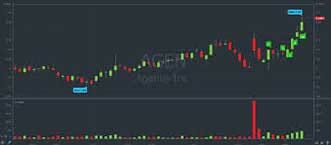 There are certainly some upsides to trading penny stocks – like being able to make a lot of money really quickly if you make the correct call – but there are quite a few serious downsides to trading penny stocks as well.
There are certainly some upsides to trading penny stocks – like being able to make a lot of money really quickly if you make the correct call – but there are quite a few serious downsides to trading penny stocks as well.
The first downside is that many of these stocks don’t trade on the large stock exchanges.
This means that there are fewer regulatory requirements, and there is a lot less trading volume and liquidity available when you start trading them.
With often such a low trading volume and small float (available shares in the company that can be purchased), it’s common for the stock prices of these companies to shoot up suddenly and then crash down just as fast.
By their very nature, the fact that these stocks are so cheap and not listed on a major stock exchange often means that they are fairly low quality companies.
These run the gamut from having either terrible financial records (IE huge amounts of debt, negative cashflow etc), being horribly mis-managed to having a product in a dying industry.
In some cases, the companies have all of the above.
With such terrible financial valuations, penny stocks like this are almost always trading at an over valued price when compared to the company’s fundamentals.
While some penny stocks do trade on the big markets (like the Nasdaq), most of them trade in low-quality markets like Pink Sheets, OTC, or OTCQX.
And these “markets” have almost no regulatory requirements at all they are often a breeding ground for virtually any type of stock scam like you may have seen in movies like “The Wolf of Wall Street” or “The Boiler Room.”
This leads to all sorts of financial manipulation that can happen with the stock.
Especially as the float is so small many fraudsters are able to run a “pump and dump” scheme where they buy up a lot of their own stock, heavily promote it to other people and then when the price increases, they dump them all for a profit and leave everyone else holding their worthless stock.
In some cases, as these markets are unregulated, there are rumors that some of the companies and scams are run through various mob organizations.
The other thing to keep in mind (that I bring up often as something to keep in mind) is that these stocks trade on very thin volume.
In big markets, there are a lot of interested buyers and sellers which means that at any point in time you can buy or sell the shares you have with ease.
But this isn’t the case with penny stocks as there are a lot fewer buyers and sellers and as a result they aren’t as “liquid.”
Where the spreads between stocks in the big markets can be pretty close together (IE where the Bid/Ask spread is very small), the spreads in penny stocks can be pretty wide (like $0.5 between the bid/ask).
This matters because when you go to sell, you might find that there is nobody interested to buy.
And when this happens, you can have to drop your price or you may end up getting stuck holding worthless stock.
So there are a lot of dangers and things that you need to keep in mind when you’re trading penny stocks.
If you’re new to trading penny stocks, you MUST educate yourself before trading anything.
For me, I see this as being non-negotiable as there are soo many different ways that you can lose money trying to trade penny stocks.
If you’re going to trade penny stocks, you need to get advice from someone who has done it successfully and is willing to teach you what to do and how to avoid most of the common mistakes that traders make….and this is the ONLY guy I’d recommend taking advice from if you’re going to venture into trading penny stocks.
The Upside – Can You Become a Millionaire from Penny Stocks?
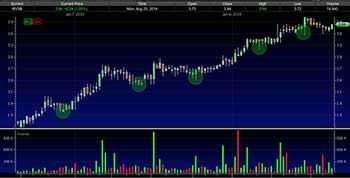 With all of the negatives out of the way, let’s look at the positives.
With all of the negatives out of the way, let’s look at the positives.
And, yes, there are some positives to trading penny stocks.
The question that’s on everyone’s mind is, “Can you become a millionaire from penny stocks?”. And the answer is “Yes”. And you can do it just like this guy did before he was 22.
The first positive is that you can get in on the “ground floor” and invest in a company that might be the next big thing.
Some investors have made millions buying companies like Microsoft, Amazon and others as they’ve just come to market. And if you pick the right one it could be you too.
The second positive is that it doesn’t take a lot of money to get started. As penny stocks trade so cheaply, you can often buy quite a few shares and get started trading for a few hundred dollars.
The third is the speed. A lot of penny stocks move very quickly and you can see your investment double, triple or even 10x in a matter of minutes or days – and this is the allure of trading penny stocks.
Where so many other stocks take a long time as they grind higher, these stocks tend to explode one way or the other in a very short amount of time.
But there is a lot of learning and investigative leg work that you’ve got to do if you’re going trade penny stocks.
Commonly Asked Questions
How to find new stocks to invest in
1) Start by gathering information. What type of stocks are you looking for? Are you interested in investing in individual companies or indexes? Is it something that involves growth, risk, size, transparency, growth rates… the list goes on. Pick one variable and do your homework! Read publications like Forbes and The Wall Street Journal if you’re interested in individual companies, log into Yahoo Finance to explore options within indexes. You can also sign up for important news alerts too!
2) Do some research to gain access to different markets around the world. Once again – what are you looking for? Stick with American markets? Or venture out across Asia or Western Europe?
3) Sign up for a trade alerts program like the one found inside The Empirical Collective.
What are some best penny stocks for investors?
Since stock prices and values fluctuate at any given time, it may be hard to work out which penny stocks would be the best for investors. Investing company shares come in all values and there is no such thing as a “one size fits all” situation. While investing can seem like a complicated matter for many neophytes, anyone with the right information at their disposal will know that it doesn’t have to cost much or go into too much detail to get their feet wet.
How much money can you make trading penny stocks?
Penny stocks don’t have much liquidity, but they are cheap. The cost to buy the stock will be very low, or even zero depending on how close to trade it is. Moreover, traders can often pay less for a penny stock than the value of the underlying investment entity because their trading fees are lower. This leaves more money in your pocket when you take your profits at the end of day trading.
If you can find a company with proximity to an up-and-coming mine or oil refinery expansion project, you may find prices for shares will soon rise significantly as word spreads about these potential developments which eventually increases investor confidence and withdraws any form of concern regarding liquidity levels.
Is day trading penny stocks profitable?
Profitable in the sense that there’s a potential for large gains, but it comes at a much higher likelihood of also seeing large losses. It is not possible to say with certainty which will come first for day traders, because their time horizons are so brief.
The problem with any trading endeavor – from penny stocks to regular stocks – is that you have two options: either take winning stock and guessing when to sell, or sell losing stock and wondering when to buy. It’s a catch-22 situation every time! Many people become addicted only to lose everything they have due to these seemingly harmless trades where money is being transacted quickly and frivolously.
Can you become a millionaire trading penny stocks?
Yes.
Over the years I have seen people make millions of dollars by trading penny stocks. The key is to find information that others don’t know about, and use it to buy low and sell high. It’s not an easy process, but if you put in the time and effort then you are bound to develop a system that works for you.
That said, most people lose money trying to trade penny stocks.
If you’re going to try and trade penny stocks, I recommend you follow this guy here.
Has anyone got rich from penny stocks?
It is easy to get rich from penny stocks if you find the right penny stock.
Penny stocks are low-priced shares that typically trade for less than $5 per share, making them an affordable financial gamble for small investors. Penny stocks come in all varieties; companies with strong financials and promising future prospects, start-up companies working on revolutionary products and services, and struggling enterprises whose best days may be many years away–perhaps never. Buying a hot penny stock can make you rich in short order but it’s also possible to lose your shirt trading these risky securities.
Are penny stocks high risk?
Yes.
Penny stocks trade in the “over the counter market” where all transactions are done over the phone, so regulators can’t control trading security. Some thieves will advertise penny stocks under false pretenses to take advantage of investors with less knowledge of how this market works. The result is often an inflated value for shares that results in huge losses for unsuspecting buyers who get caught up in unscrupulous scams trying to jump onto the latest trend rather than doing their research before investing. And while it’s not always true, sometimes insider trading does go on among company owners and stock traders who try to mislead people into buying or selling stocks at artificially inflated values.
Roughly 1/3 of penny stocks fail.
Penny stocks are typically high-risk investments, but have the potential for significantly higher returns. You might remember them from the dotcom era when both Yahoo and Google had to endure some extremely volatile price actions. My favorite quote about these types of investments comes from Seth Klarman, who is known as “a hedge fund manager’s hedge fund manager”. He once said that if you’re betting on a horse race, would you buy an overpriced mare that’s never run before or an unsound nag with a shaky jockey? Penny stocks are often highly speculative since they represent small private companies with very little history.
What are the risks of penny stocks?
There are a few risks associated with penny stocks. Among the most important is the fact that many of them don’t have any assets, which means that you can end up putting your money on something that has nothing but goodwill to offer. Another problem is the company’s financial status. In these types of companies, where there are no formal requirements for reporting financial information or business records and its still too early to see if they might stand a chance of success, it’s difficult to tell what the odds are for actually recovering anything after putting your money in. And if they do go under? Well, these companies often find themselves in bankruptcy and enter receivership only after their stock price falls so low and stay down too long that they’ve become delisted.
At what price is a penny stock no longer a penny stock?
It depends on the stock and where one lives.
A penny stock can also be interpreted as a deep-discount security, which is typically valued at $5 or less. For example, if you live in Canada and purchase stocks for $3 per share to sell for $4 per share, it’s considered a penny stock. If you live in Taiwan and purchase stocks for ¢1 (¢ variation) per share to sell for ₩10 (₩ variation) per share, it’s considered a penny stock too because the price difference of those shares is greater than 10%.
How long should I hold penny stocks?
Generally, I would recommend holding penny stocks for no more than 2-3 days.
Penny stocks are not ideally suited for “buy and hold” strategies because most of the movements in their price indexes is attributable to interest and dividend payments which typically occur at fairly predictable intervals (i.e. quarterly). With this in mind, it’s obvious that any sizable portfolio with a focus on penny stocks will require fairly constant monitoring and occasional adjustments to implement the optimal investment strategy.
There is another downside to passively holding low price index assets like penny stocks which can be summed up with one word; stagnation. A long term buy and hold strategy might feel good when you’re cashing in dividends each quarter but there’s really nothing happening with penny stocks.
Are penny stocks good for beginners?
No.
Penny stocks are high-risk investments. What may seem like a good deal for beginners to make money could end badly, with no investment or little investment in return. The major issue is that these companies are usually at the verge of bankruptcy, which means the stocks could drop significantly, risking investors’ money in an unsafe gamble.
Can a stock go below 1 cent?
Yes, in theory it could.
In fact, stocks can go below a penny per share for a few reasons. The first reason is the result of regulation from the Securities and Exchange Commission (SEC). In order to raise money or to allow investments in a company that isn’t small, medium or large-sized, “registration” must be filed with the SEC. Anything under $1 million USD can be registered on an exempt basis without going through any formal process by using Rule 504 of Regulation D of the Securities Act of 1933. Secondly they can simply split their shares into fractions so that instead of selling one share at $10 there are now 100 shares at $1 each after splitting shares.
Why do most day traders fail?
They fail because a majority of the people engaging in day trading types of work are speculators, not investors.
Another big reason is that they can’t manage their trade size and often trade too much of their portfolio in one trade, and they get wiped out.
How to search for stocks that may increase in value soon
1)Ask yourself, what do you know best? For instance, if you’re a meteorologist, then look for weather related stocks. If you work in marketing, find fashion or tech stock.
2)Look at the company’s management–do they seem to have experience with the industry or is it their first foray?
3)What are analysts saying about them (you can get this information by reading articles on CNBC)? Is sentiment in general positive?
4)Look at recent earnings reports and compare them with past results–this will clue you in to things like expenses and profits that might be hurting or helping the company respectively.
5)Check out their financial statements (or annual report)–what is good and what is bad about the company?
Why do people trade and invest in High RSI Penny Stocks?
Higher risk equals higher rewards.
There are two main reasons people trade these stocks. First, the stock price is so low that even if you buy one share they can be seen to double in value with the least move in the “right” direction which means it pays off if they do go up because $90 profit on $10 isn’t bad. Second,they know that the high RSI gives them an edge over most traders who think its risky to trade high volatility moves they see as more risky than just trading small shares in the larger stocks in the market.
What is the best time to buy penny stocks?
It is best to buy penny stocks in the morning. Most of the time it’s between 9:30 am and 10:30 am EST.
It is best to buy penny stocks in the morning when it seems like investors will earn more money for buying and selling them. Another consideration: economies often start doing better in the spring, which means optimism improves about investing in stocks, and this creates a trading opportunity with cheaper prices.
I can’t stress enough the need for you to learn and educate yourself if you’re going to get into this.
You need to take a few courses. And I highly recommend you follow the trades of someone with more experience trading than you. Or you’re just asking to lose all of your money.
But, “Can you make a lot of money trading penny stocks?” Absolutely. There is no question about it that there are a lot of opportunities to make a lot of money doing it.
In fact, some like this guy make MILLIONS doing it.
For me, I’ve made some money doing it but I tend to avoid trading penny stocks.
Instead, my team and I place simple directional trades using stock options on the major stock exchanges.
No complicated trading strategies. No lack of liquidity. And you can avoid the huge scams.
We keep it simple and easy for our members to follow – even if they have a day job.
And the results have been amazing.
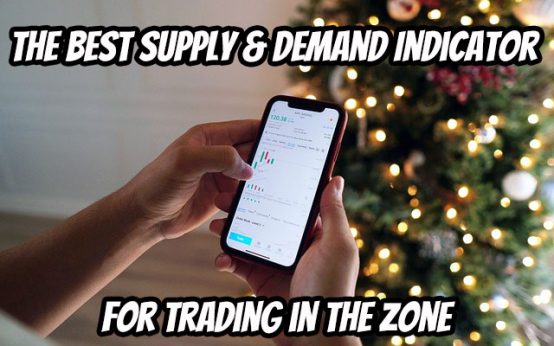 The Best Supply and Demand Indicator for Trading in the Zone
The Best Supply and Demand Indicator for Trading in the Zone 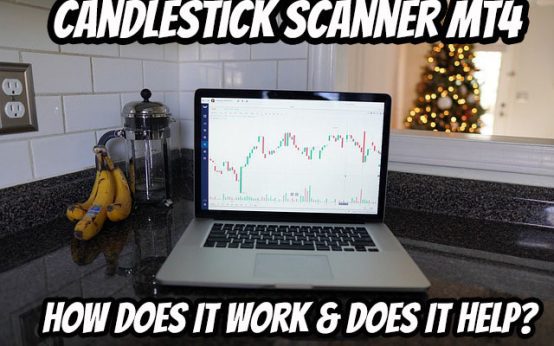 Candlestick Scanner MT4: How Does It Work & Does It Help?
Candlestick Scanner MT4: How Does It Work & Does It Help? 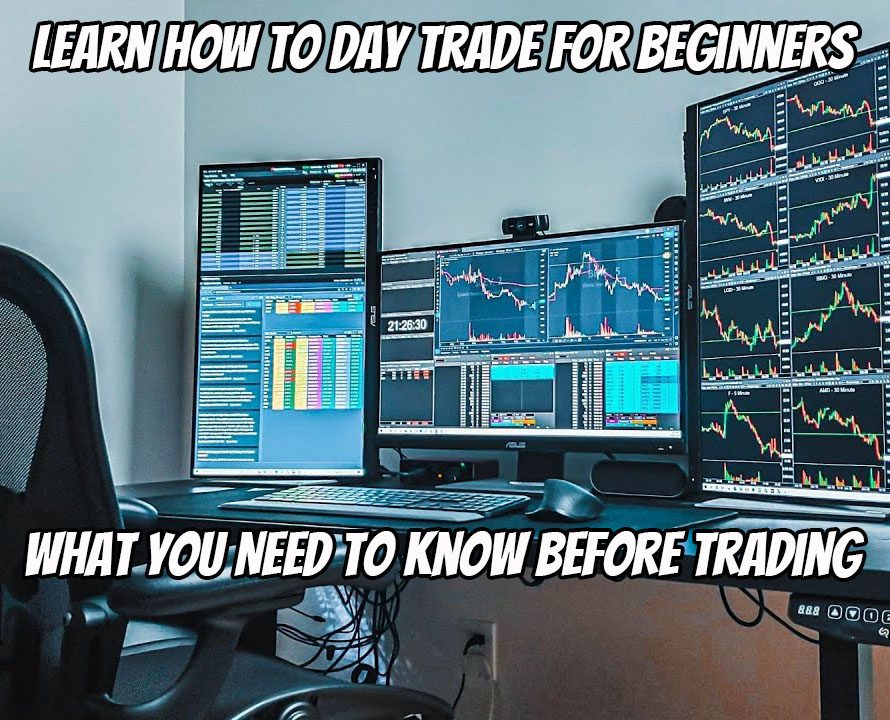 Learn How to Day Trade for Beginners – What You Need To Know Before Trading
Learn How to Day Trade for Beginners – What You Need To Know Before Trading 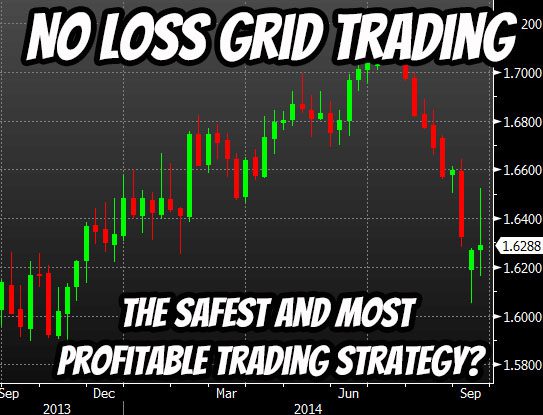 No Loss Grid Trading – The Safest and Most Profitable Trading Strategy?
No Loss Grid Trading – The Safest and Most Profitable Trading Strategy? 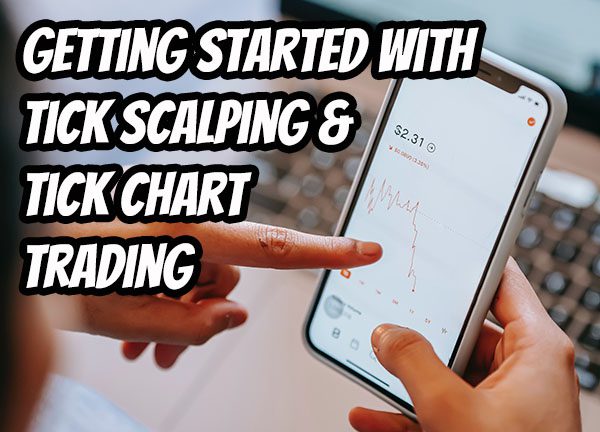 Getting Started With Tick Scalping & Tick Chart Trading
Getting Started With Tick Scalping & Tick Chart Trading  Shark Fin Trading Indicator: Here’s How to Discover This Harmonic Trading Pattern
Shark Fin Trading Indicator: Here’s How to Discover This Harmonic Trading Pattern